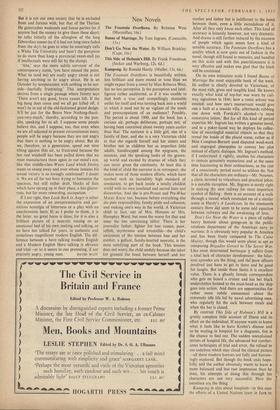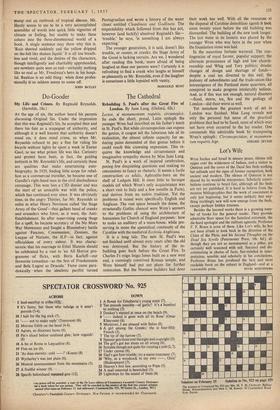New Novels
The Fountain Overflows. By Rebecca West. (Macmillan, 16s.) This Side of Holmin's Hill. By Frank Freedman. (Seeker and Warburg, 12s. 6d.)
Kampong. By Ronald Hardy. (Muller, 13s. 6d.) The Fountain Overflows is beautifully written, less brilliant and more muted in tone than we might expect from a novel by Miss Rebecca West, but no less perceptive. Is the perception and intel- ligence rather undirected, as if it was unable to find both a true and compellingly shareable outlet for itself and was turning back into a world in which it need not be so vigilant of the needs and preoccupations of an audience? Possibly. The period is about 1900, and the book has a curious air, perhaps deliberate, perhaps not, of having been conceived about twenty years earlier than that. The narrator is a little girl, one of a family of four, and she is a very Victorian child in that she regards herself and her sisters and brother not as children but as imperfect little adults, handicapped among the epigrams, the nuances, and the speaking looks of the grown- up world and excited by dramas of which they can never grasp the continuity. At least this is the kind of child the narrator is in retrospect; she makes none of those modern efforts, which have reached such an incredibly high standard. of simulation, to get back inside a totally childish world with its own insulated and sacred lusts and discoveries. And she is pre-Proust and Pre-What Maisie Knew too, because before everything else she puts responsibility, family pride and cohesion, and making one's way in the world. A Victorian child in fact, out of Mrs. Hemans or Mrs. Humphry Ward, but none the worse for that and none the less convincing either. There is her journalist father, fighter for lost causes, poor, selfish, mysterious and irresistible—the child's awareness of the tension between him and her mother, a gallant, family-hearted neurotic, is the most satisfying part of the book. This tension does not worry the child unduly because she takes for granted the bond between herself and her mother and father but is indifferent to the bond between them, even a little incredulous of it.
After all they only know each other. This kind of
accuracy is leisurely however, not very dramatic. And drama is still further reduced by the niceness of people which again seems here a kind of
sensible accuracy. The Fountain Overflows has a quality which is now quite out of fashion in the
novel, though still found in memoirs, and handled on this scale and with this punctiliousness it is very effective and makes one glad that the book will be continued.
On its own miniature scale I found Banns of Marriage the most enjoyable book of the week.
Its author is clearly devoted to Victoriana, of the most rich, gross and tangible kind. He knows exactly what kind of top-hat was worn by rail- way signalmen in 1846; how a rustic arbour was erected; and how one's manservant would give one .a bath at a seaside villa, afterwards rubbing one down with Forskahl's alcohol—`a most restorative lotion.' But for all this kind of period expertise Mr. Ingram has written a genuine novel, and in a poker-faced way he deploys his collec- tion of meaningful material objects so that they reveal the inside of the placid scene, rather as if Miss Compton-Burnett used disputed wool-work and engorged pineapples to convey her plot instead of elliptic dialogue. Mr. Ingram's method, if I understand it rightly, enables his characters to remain genuinely mysterious and at the same time fascinating in their ordinariness, as the cast of a consciously period novel so seldom do. Not that all the characters are ordinary—Mr. Noames, a cleric devoted to viticulture and practical jokes, is a notable exception. Mr. Ingram is surely right in making the new railway his most important
symbol of feeling: there is an account of a walk through a tunnel which reminded me of a similar scene in Hardy's A Laodicean. In the nineteenth century there did seem to be some odd equation between railways and the awakening of love.
Don't Go Near the Water is a piece of rather heavy humour about goings-on in the public
relations department of the American navy in
wartime. It is obviously very popular in America and has been freely compared to The Caine Mutiny, though this would seem about as apt as comparing Brigadier Gerard to The Secret War. Like most determined burlesque it suffers from
a total lack of character development : the hilar- ious episodes are the thing, and the poor officers involved just have to get in there and be good for laughs. But inside these limits it is excellent value. There is a ghastly female correspondent who gets on board a cruiser and has her black underclothes hoisted to the mast-head as the ship goes into action. And there are opportunities for rather more subtle amusement about the extremely idle life led by naval advertising men, who regularly hit the sack between meals and when the bar is closed.
By contrast This Side of Holman's Hill is a grimly complete little account of illness and its
effect on the individual. If anyone wants to know
what it feels like to have Krohn's disease and to be waiting in hospital for a diagnosis, this is
the chance to find out. The sudden unexplained terrors of hospital life, the advanced but cumber- some techniques of trial and error, the refusal to use sedatives which may cloud the clinical picture —all these modern horrors are fully and harrow- ingly explored. But though the book ends hope- fully and the author obviously wants to leave a more balanced and less raw impression than he does, his attempts at doing this through his characters are not very successful. Here the intestines are the thing.
Kampong is also about hospitals—in this case the efforts of a United Nations team in Java to
stamp out an outbreak of tropical disease. Mr. Hardy seems to me to be a very accomplished assembler of words into quick little vignettes of climate or feeling, but unable to make these cohere into the three-dimensional world of a book. A single sentence may show why this is. 'Rain sheeted suddenly and the yellow dripped on the hill like shaken liquid.' It is all too breath- less and vivid, and the desires of the characters, though intelligently and charitably apprehended, are nowhere quite seen as real—certainly nothing like so real as Mr. Freedman's hero in his hospi- tal. Realism is an odd thing: when done profes- sionally it so seldom seems to come off.
JOHN BAYLEY



































 Previous page
Previous page